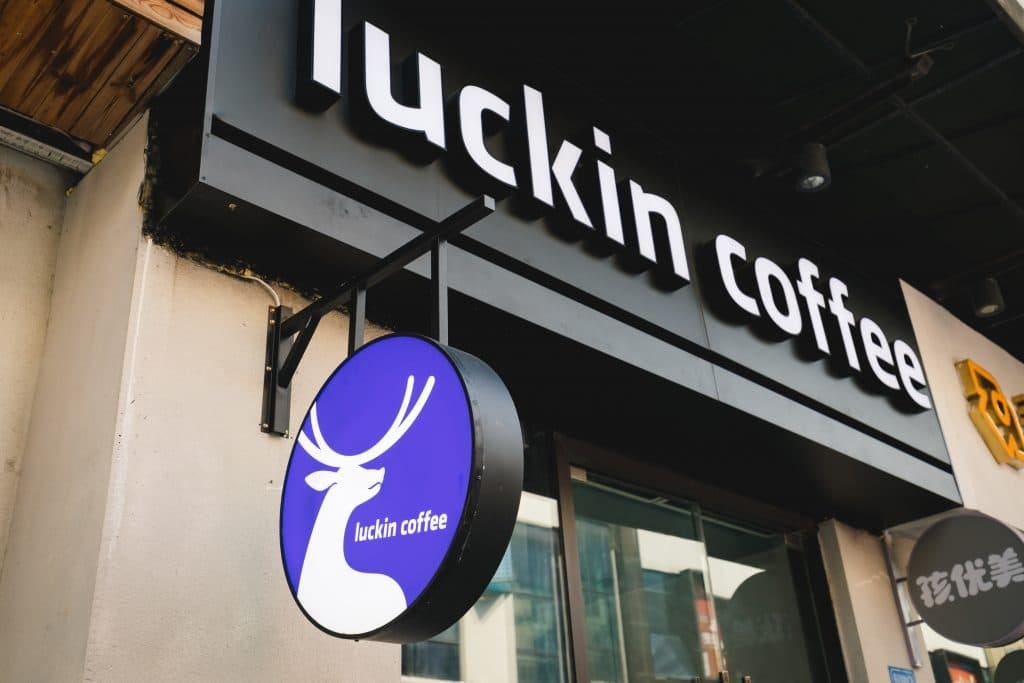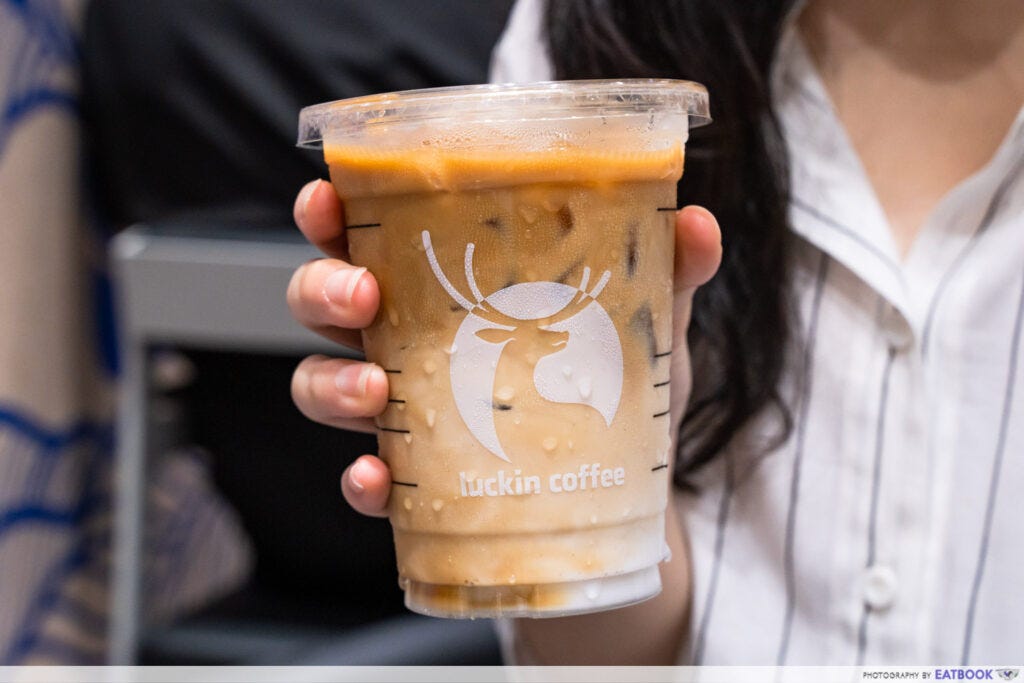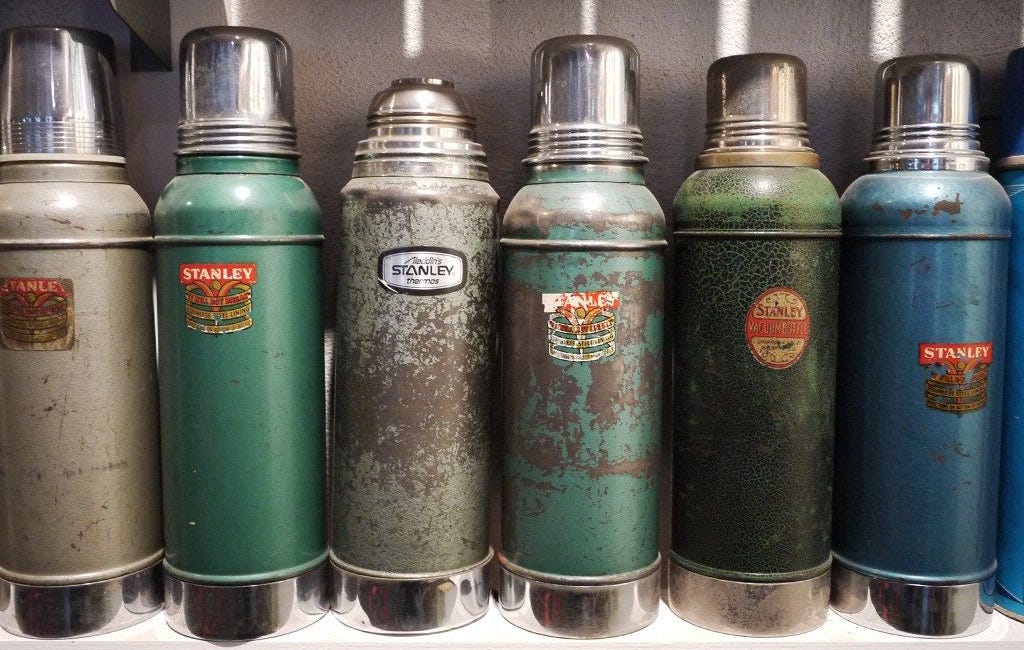6 Lessons I wish I learned faster, How Luckin Coffee turned around a near bankruptcy, & Why sometimes, believing nonsense, can help you
2 Marketing Breakdowns & 1 Case Study
What’s good young and eager mind!
Before we get into today’s piece, I’m accepting 2 new students to the Solopreneur Gym. Gradually expanding, so once those seats are filled, SG closes down again.
If you’re serious about either getting to $10,000/month as a solopreneur by selling your expertise online or if you’re stuck at $20K and want to learn how to move past it, grab your spot and don’t miss out.
Most students who buy earn their investment back within a few months.
Just got done uploading the live guest Masterclass on designing and selling workshops.
This Masterclass along with hundreds of hours of past content is available to you when you join, on top of the one-on-one Coaching, access to the community, & Live Masterclasses.
Metaphorical truths in solopreneurship - Why sometimes, believing nonsense, can help you
I’m talking about the last Trick in this reel: “Cheat Gainer Hook”
6 lessons I wish I learned faster
Don't internalize rejection.
When people reject something, they're rejecting that something. They're not rejecting you.
After all these years, you barely know yourself. So let alone a stranger who's spent a grand total of 5 minutes with you.
You can blame the world or you can get what you want, but you can't do both.
The statement "everything is in my control" is just as false as "nothing is in my control."
Internal locus of control vs. External locus of control in psychology.
But the former is much more conducive to you achieving your goals.
If you have that belief, you'll fuck up occasionally (thinking something was in your control that wasn't) but you'll also correctly identify the cases where you're right.
If you have the latter belief, you won't make the mistake of believing something is in your control that isn't, but that comes at the cost of missing every single instance where something was inside of your control but you believed it wasn't.
Nihilism & cynicism are exceeding costly ways to go through life.
Quality matters more than quantity. But quality comes from quantity.
Your best content comes from tons of fuck ups.
Meeting your person comes from going on a lot of bad dates.
Finding your dream job or starting your dream business is a result of many failures.
Luck exists but the harder you work, the luckier you get.
Luck is a factor. You can't deny that.
However, some people swing too far and use that as a way to diminish anyone's success.
According to Dissonance Theory, this helps preserve the self-image of those people. If you wanna see yourself as capable, you can either build yourself up or tear others down. Both are viable pathways to maintain your self-image. But the former is more productive.
If you decide to hit a golf ball 200 times per day and after 10 years you hit a hole-in-one, technically you got lucky...
But does any rational person truly believe that?
Put yourself in a position to get lucky.
The people who're important to you now, may not be in 5 years.
Relationships change. Friends move. People get different jobs, kids, or other responsibilities.
And that's just a part of life.
If you're aware of that, you'll try to approach the "golden times" that much more when you're in them.
Think for yourself and don't blindly obey the culture.
Everyone wants to believe they think for themselves... But most don't.
Their beliefs just so happen to perfectly align with those of their in-group?
Impossible.
Try to reason carefully and critically and see if you yourself, independently, come to the same conclusions.
You get 1 life. Don't waste it living someone else's.
Notes
Re: the quality/quantity point, this parable is insightful:
A ceramics teacher announced on opening day that he was dividing the class into two groups.
All those on the left side of the studio, he said, would be graded solely on the quantity of work they produced, all those on the right solely on its quality.
His procedure was simple: on the final day of class he would bring in his bathroom scales and weigh the work of the “quantity” group: fifty pound of pots rated an “A”, forty pounds a “B”, and so on.
Those being graded on “quality”, however, needed to produce only one pot — albeit a perfect one — to get an “A”.
Well, came grading time and a curious fact emerged: the works of highest quality were all produced by the group being graded for quantity.
It seems that while the “quantity” group was busily churning out piles of work – and learning from their mistakes — the “quality” group had sat theorizing about perfection, and in the end had little more to show for their efforts than grandiose theories and a pile of dead clay.
You can turn around even the worst situation.
Luckin Coffee faked half its $700M revenue causing the share price to drop by 97%.
In 2020, it was discovered that Luckin Coffee fabricated sales data. Nearly $350M in sales were faked. The share price tanked by 95% and the business almost went bankrupt. They did a 180 on their marketing strategy and 3 years later surpassed Starbucks as China's largest coffee chain.
Here's Luckin Coffee in 8 bullet points:
In 2018, Luckin Coffee had an annual profit of negative $250M. In 2019, that grew to negative $500M. And in 2020 it was negative $800M. Luckin Coffee claimed to be a tech company "pioneering a technology-driven new retail model" on its way to disrupt Starbucks.
Their new retail model was that the coffees were ordered and paid for via their app and that they only did self-pickup or delivery. This freed up baristas to only make coffee & lowered rent because it decreased the stores' footprints. That lower cost could then be passed on to the consumers in the form of cheaper coffee.
On paper, that plan sounds good. IRL, if you charge bottom-of-the-barrel prices, you attract - bottom-of-the-barrel customers. On top of that, they gave free coffee to new customers & gave huge discounts to existing ones (as much as 80% off). In 2018, Starbucks China charged $4.50 for a coffee on average. Luckin charged $1.40.
As a result, they attracted loads of customers and created a business model where they had to spend $3 to earn $1. The marketing strategy was a classic loss leader: Sell at a loss, establish consumer habits, raise the price and profit.
Technical people often believe the only reason people buy things is for their utility (functional benefits), and everyone else is an imbecile. But Marketing Science has known since at least the 1970s (See Prof Tauber's Why Do People Shop) that there are other reasons such as emotional and social. Luckin hoped their customers would stick but the psychographic [1] they attracted were strictly utility customers. Put simply, they just wanted the cheapest possible source of caffeine. Luckin raised prices, customers stopped buying. This is what led Luckin to fabricate sales data to pretend the strategy was working.
Some people look down on the fundamentals. Claiming they're too obvious and only idiots don't know them. But the thing about basics is that they're useless unless you: 1. Know them, and 2. Master them. So Luckin went back to the basics. Profit = Revenue - Cost. To increase profit, they created a new strategy to increase revenue and decrease costs.
To cut costs, they closed down unprofitable stores, got rid of vending machines, the plan to make fruit juice, and cut the marketing budget by $60M+. To increase revenue, they innovated products. One huge hit was brown sugar boba coffee. Something a team came up with while playing around with ideas for Luckin's tea line. [2] Luckin started heavily investing in R&D and their new products were sold more and at higher prices.
This might remind you of the case study we did on Stanley:
They created this thermos in 1913. A century later it's the TikTok obsession of millennial & gen Z women – Here's what we can learn from the Stanley Cups
What’s good young and eager mind! Last post of the week already :) Let me get your input on something… I’ve been writing 5 posts a week for a few years now. But I’m considering dialing it back to once a week. I’m considering using the time that frees up to make YouTube vids.
On top of that, Luckin also overhauled its marketing from performance-based to brand-based [3], incorporated influencer marketing, and launched franchising. Luckin went from almost being the lowest in 2019 in terms of brand preference to number 1 in 2022, while Starbucks went from first place to last place. Last quarter they did $138 million net income.
Notes
[1] A psychographic is a form of market segmentation. You're familiar with demographics. That's a technique to group a market based on features like gender, age, religion, yearly income, and so on. Psychographic segmentation refers to shared beliefs/goals: environmentally friendly, zero plastic, veganism, liberal/democrat, and so on. Demographics can be useful to describe what your customer base has in common but most trained marketers look for psychographics instead and try to figure out the "Job To Be Done." Which is a framework that asks: "What are the 'jobs' our customers are 'hiring' our product for?"
[2] Another big idea here, which comes directly from behavioral economics, is that to get a big output, you don't necessarily need a big input. It's easy to read this and roll your eyes because you think it's obvious. It's not. Realizing that small tweaks and ideas can have non-linear outcomes is a huge deal and extremely counterintuitive. It implies that if you're looking to make big changes in your own business, there might be gold in small tweaks you're currently overlooking.
[3] Challenging yet another marketing myth that it's all about performance marketing. How much ROI do you get for every $1 spent? I'm not even gonna touch the impossibly hard marketing attribution problem. But Marketing Science has known for a long time that brand-building leads to some short-term sales, makes performance more effective, allows brands to increase the price (brand equity), and grows the revenue over the long term. While performance marketing can only ever scoop up existing demand. You wanna do both, but the idea that brand marketing is wasted money shows a "bro-science" understanding of marketing.
After having trained hundreds of students in solopreneurship over the years, I’ve come to the conclusion:
Everyone is where they deserve to be.
The popular narrative online is that some people are lucky “privileged” and others aren’t.
But whenever I have students who aren’t where they wanna be, they’re always the ones making the same mistakes:
- Bias towards inaction
- Overly focused with consuming info instead of executing on it
- Consuming general info instead of problem-solving info
- Defeatist attitude. After much prodding takes one step forward, then immediately gets discouraged cuz they aren’t millionaires instantly.
- Amateur mindset instead of Pro. Not showing up to meetings. Ghosting. Inconsistency. Not doing the work. Excuses. Victim mentality. And so on.
People think “deserve” is a word that says something about morality.
“You deserve X, you’re such a good person.”
But it’s more like physics.
You “deserve” a certain outcome if you consistently do the right things on the input side.
You “deserve” to build muscles if you lift heavy and eat enough protein in a caloric surplus.
You don’t “deserve” muscles if you’re doing chess all day.
Not because one makes you a better/worse person.
But because playing chess doesn’t cause muscular hypertrophy.
Unfortunately, in today’s society, we suffer from the moralistic fallacy.
“The way the world ought to be is the way the world IS.”
Ergo, if you’re a good person, you deserve good things.
But that’s simply not how our universe works.
It’s all cause and effect.
Input and output.
Notes
An interesting find I came across via experimental psychologist Daniël Lakens was this post on why complaining about the incentive structure isn’t a good excuse to do poor science: No, it’s not The Incentives—it’s you.
Hope you had a good read!
Chop wood & carry water, and I might see you in the Solopreneur Gym :)
RJY









